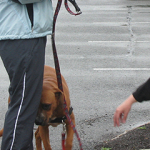This is Blog #3 of a 5 part series on how to prevent your dogs from biting a stranger using a positive approach.

Blog #1 How to Stop Aggressive Dog Barking at People.
Read Blog #1 I discuss the importance of good management; preventing your dog from practicing the unwanted behavior of lunging at people.
Blog #2 Dog Aggression Towards Humans.
Read Blog #2 I explain how to desensitize and counter condition; or change how your dog feels about people.
In this Blog I will teach you how to prevent your dog from biting a person by helping you understand when your dog is feeling stressed and needs more space from an unfamiliar person. Dogs will offer requests for distance, called distance cues until they learn that their requests go ignored by the human. If they are still afraid, they will simply bite as their fear overrides their ability to think.
Distance Cues are body postures or signs your dog uses to tell strangers (and other dogs) they would like to have more space. These behaviors begin with the puppy and are called “shy dogs” and can include skittish behaviors such as looking away, leaning away, cowering, hiding under furniture, paw lifted, quick lip licking, and enlarged eyes with the whites of the eyes showing.

If you see your dog offer a distance cue then you need to help your dog by asking people to ignore your dog, back away or removing your dog from the encounter. Low level distances cues should never be punished, as this can result in a dog that is not allowed to express his fear, hence the dog may bite with no apparent warning.

Some dogs learn that these distance cues are ignored by humans, so they simply avoid humans to avoid conflict. However, many dogs learn to use more aggressive cues and postures such as head up with a forward stance, growling, lip curling, air snapping, lunging and barking just to mention a few.
Sadly, I have had hundreds of clients tell me their dog used to be “shy with humans but is now lunging and snapping at them.” If a fearful/shy dog is not properly conditioned to see people as a source of good things, he may learn to use more forward body postures with a show of teeth, growling or air snapping. When a dog learns that this posture works, of course they will use it as it makes them feel safe.
Unfortunately, if a fast moving person or child moves into a shy or fearful dogs space, your dog may not have time to show a low level distance cue and may bite as they simply did not have time to think, and they just reacted out of fear. Imagine when a bee flies at your face, many of you will swat it with your hand, right? Are you being aggressive or defensive? My experience is that most dogs bite in a defensive manner.

What can you do if your puppy is shy? Find a Puppy Socialization Class with a focus on bite inhibition, also known as a “soft mouth” behaviors. Judy’s Puppy Socialization Class for the Family Pet In addition, you can learn the Treat and Retreat Program designed by Suzanne Clothier which can be found in many Shy Dog Classes, Fear Aggression /Shy Dog Class. In this class I discuss key topics:
- Invasion of space and how social pressure effects your dog
- How Reinforcers are used to increase confidence
- Safety while adding criteria in a slow progression

Finally, if you are feeling overwhelmed with your dogs growly behavior towards your friend, or even a family member, think about this criteria.
- Be sure you teach your dog a soft mouth.Teach a soft mouth
- Change how your dog feels about strangers using classical conditioning and desensitization
- Learn canine body language so you know when your dog is feeling stressed.


